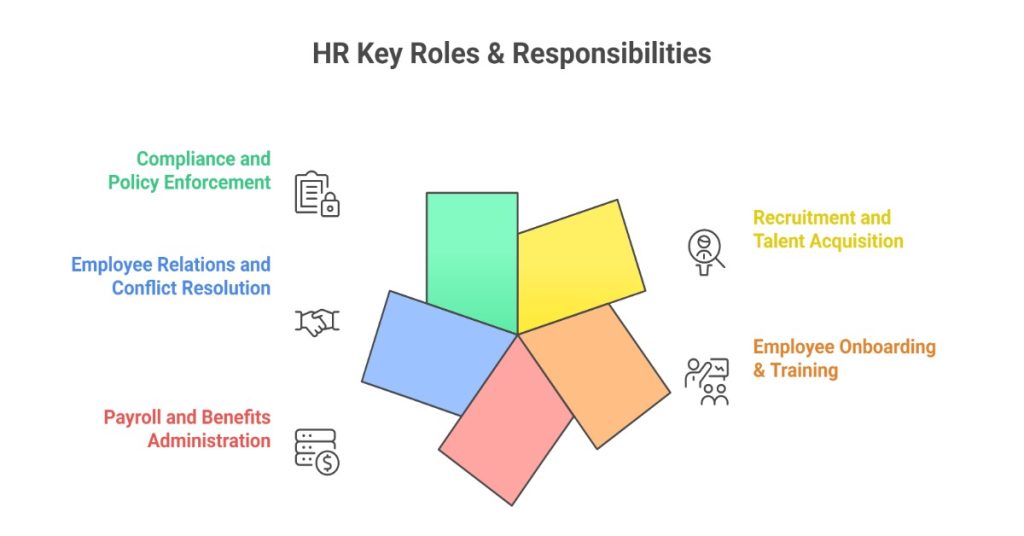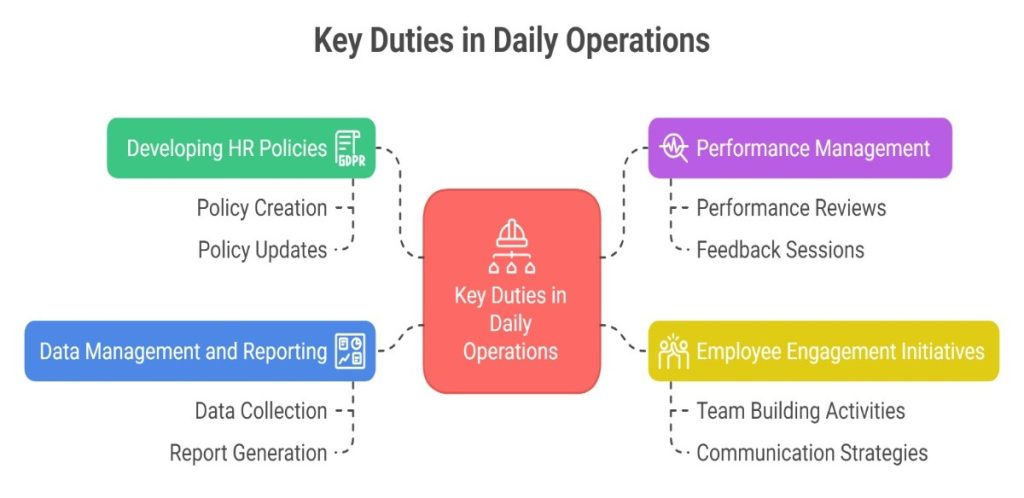The role of an HR executive is pivotal in shaping an organization’s workforce and culture. They act as the backbone of human resources, ensuring that the company attracts, retains, and develops talent effectively. This blog explores their responsibilities, essential skills, and key duties in detail.
What Is an HR Executive?
Definition and Overview
An HR executive is a professional responsible for managing an organization’s human resources functions. They handle recruitment, employee relations, compliance, and more. Their work ensures a productive and positive workplace.
HR bridges the gap between management and employees. They align HR strategies with business goals. This role demands both strategic thinking and hands-on operational skills.
HR Executive vs. HR Manager
While both roles focus on human resources, an HR executive typically has a broader scope. They often oversee multiple HR functions and report to senior management. HR managers, by contrast, may focus on specific areas like recruitment or training.
Executives are more involved in strategic planning. They shape company culture and policies. Managers execute these plans with a focus on day-to-day operations.
Key Roles and Responsibilities
HR executives wear many hats to keep the workforce thriving. Their responsibilities span multiple areas, from hiring to compliance. Below are their core duties.
Recruitment and Talent Acquisition
HR executives lead the recruitment process, from job postings to interviews. They identify talent that fits the company’s needs and culture. This involves crafting job descriptions and collaborating with hiring managers.
They also leverage platforms like LinkedIn and job boards. Building a strong employer brand is key to attracting top talent. Data shows that 75% of job seekers research a company’s reputation before applying.
Employee Onboarding and Training
Once hired, employees need a smooth onboarding experience. HR executives design programs to integrate new hires effectively. This includes orientation sessions, training plans, and mentorship programs.
Effective onboarding boosts retention by 82%, according to studies. HR ensures new employees understand their roles and company values. They also coordinate ongoing training to upskill the workforce.
Payroll and Benefits Administration
HR executives oversee payroll processes, ensuring timely and accurate payments. They manage benefits like health insurance, retirement plans, and leave policies. Accuracy in this area is critical to employee satisfaction.
They also negotiate with vendors to secure cost-effective benefits packages. Staying updated on tax laws and regulations is essential. Errors in payroll can lead to distrust and legal issues.
Employee Relations and Conflict Resolution
Maintaining a harmonious workplace is a core responsibility. HR executives mediate disputes and address employee concerns. They foster open communication to prevent conflicts from escalating.
They also conduct exit interviews to understand turnover reasons. This feedback helps improve workplace policies. A positive work environment increases productivity by 12%, research suggests.
Compliance and Policy Enforcement
HR executives ensure the organization complies with labor laws and regulations. They stay updated on laws like FMLA, ADA, and OSHA. Non-compliance can result in hefty fines or lawsuits.
They also enforce company policies, such as anti-discrimination rules. Regular audits and training sessions help maintain a lawful workplace. This protects both employees and the organization.

Essential Skills for HR Executives
To excel, executives need a diverse skill set. These skills enable them to handle complex tasks effectively. Below are the most critical ones.
Communication and Interpersonal Skills
Clear communication is vital for HR executives. They interact with employees, managers, and external stakeholders daily. Active listening and empathy build trust and rapport.
They must also deliver tough feedback tactfully. Strong interpersonal skills help resolve conflicts and foster collaboration. These abilities are non-negotiable for success.
Organizational and Time Management Skills
HR executives juggle multiple tasks, from recruitment to compliance audits. Staying organized ensures nothing falls through the cracks. Tools like Trello or Asana can help manage workflows.
Time management is equally important. Deadlines for payroll or performance reviews are strict. Prioritizing tasks effectively keeps operations smooth.
Analytical and Problem-Solving Skills
Data-driven decisions are a hallmark of modern HR. Executives analyze metrics like turnover rates and employee engagement scores. This helps identify trends and areas for improvement.
Problem-solving skills are crucial for addressing workplace issues. Whether it’s a policy gap or a team conflict, HR executives find practical solutions. Analytical thinking drives strategic HR planning.
Technical and HR Software Proficiency
HR executives rely on software like HRIS (e.g., Workday, BambooHR) for efficiency. These tools manage employee data, payroll, and performance tracking. Familiarity with Microsoft Office and analytics tools is also essential.
Adopting new technology, like AI-driven recruitment platforms, is becoming common. A 2023 survey found 60% of HR professionals use software to streamline tasks. Staying tech-savvy is a must.
Key Duties in Daily Operations
Beyond broad roles, HR also handles specific daily tasks. These duties ensure the organization runs smoothly. Here’s a closer look.
Developing HR Policies
HR executives create and update policies on attendance, dress code, and more. These policies align with company goals and legal requirements. Clear policies reduce ambiguity and promote fairness.
They also communicate policies to employees through handbooks or training. Regular updates ensure policies remain relevant. This fosters a consistent and equitable workplace.
Performance Management
HR executives oversee performance reviews and goal-setting processes. They work with managers to evaluate employee performance fairly. This includes designing appraisal systems and tracking progress.
They also identify high performers for promotions or rewards. Constructive feedback helps employees grow. Performance management drives accountability and productivity.
Employee Engagement Initiatives
Engaged employees are 23% more productive, per Gallup research. HR executives launch initiatives like team-building events or wellness programs. These efforts boost morale and loyalty.
They also conduct surveys to gauge employee satisfaction. Acting on feedback shows employees their voices matter. Engagement is key to retaining top talent.
Data Management and Reporting
HR executives maintain accurate employee records, from contracts to performance data. They generate reports for senior management on metrics like hiring costs or turnover rates. This informs strategic decisions.
Data privacy is critical, given regulations like GDPR. HR ensures secure storage and handling of sensitive information. Reliable data supports long-term planning.

People Also Ask (PAA) Questions
What qualifications are needed for an HR executive?
A bachelor’s degree in HR, business, or a related field is typically required. Many employers prefer candidates with an MBA or HR certifications like SHRM-CP or PHR. Relevant experience (3-5 years) in HR roles is also essential.
What is the average salary of an HR executive?
The average salary varies by region and industry. In the U.S., HR executives earn around $60,000-$90,000 annually, per 2023 data. Senior roles or those in large firms can exceed $120,000.
How does an HR executive differ from an HR generalist?
An HR executive has a strategic, leadership-focused role, overseeing multiple HR functions. HR generalists handle day-to-day tasks like payroll or recruitment support. Executives typically have more decision-making authority.
What are the career prospects for HR executives?
HR executives can advance to roles like HR manager, director, or chief human resources officer (CHRO). The demand for HR professionals is growing, with a 7% job growth projected by 2030. Continuous learning and certifications enhance prospects.
What tools do HR executives use?
HR executives use HRIS platforms (e.g., Workday, SAP SuccessFactors), payroll software (e.g., ADP), and recruitment tools (e.g., LinkedIn Recruiter). They also rely on analytics tools and Microsoft Office for reporting and communication.
Challenges Faced by HR Executives
HR executives face unique challenges in their roles. Balancing employee needs with business goals is a constant struggle. They must navigate sensitive issues like layoffs or workplace disputes with care.
Keeping up with changing labor laws is another hurdle. Non-compliance can lead to legal risks. Additionally, managing remote or hybrid workforces requires adapting to new technologies and policies.
Employee burnout and disengagement are growing concerns. HR executives must design wellness programs to address mental health. These challenges demand resilience and adaptability.
How to Become an HR Executive
Start with a relevant degree, such as HR or business administration. Gain experience through internships or entry-level HR roles. Certifications like SHRM or HRCI can boost credibility.
Networking is crucial—join HR associations or attend industry events. Stay updated on HR trends and technology. With 3-5 years of experience, you can transition to an executive role.
Read More
Workshop Feedback Sample: Post-Training Review Templates
Preschool Parents Feedback for School: Constructive Examples
Conclusion
HR executives play a critical role in building thriving workplaces. Their responsibilities range from recruitment to compliance, requiring a mix of strategic and operational skills. By mastering communication, technology, and problem-solving, they drive organizational success.
This role is both challenging and rewarding. With the right qualifications and experience, anyone can excel as an HR executive. Their impact on employee satisfaction and business growth is undeniable.

